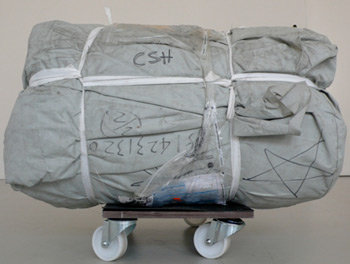Can you speak of this? -Yes, I can
dal 19/10/2009 al 14/11/2009
Segnalato da
A.C.A.B.
The Archive of Self-Management
Ziad Antar
Yael Bartana
Lutz Becker
Yane Calovski
Libia Castro
Olafur Olafsson
Chto Delat / What is to be done?
Ronen Eidelman
Esra Ersen
Ivan Grubanov
Nicoline van Harskamp
Thijs Gadiot
Danilo Kis
Aydan Murtezaoglu
Dragan Nikolic
Florian Schneider
Slaven Tolj
Liu Wei
Sharif Waked
Eyal Weizman
Judi Werthein
Arthur Zmijewski
Zelimir Zilnik
Anselm Franke
Vít Havranek
Zbynek Baladran
Ana Janevski
Erden Kosova
Nina Montmann
Jelena Vesic
19/10/2009
Can you speak of this? -Yes, I can
Different Venues, Banja Luka
The title of the multi-faceted project Where Everything is Yet to Happen - starting off in Bosnia-Herzegovina in the framework of SpaPort Biennial 2009/10 - contains references to duration, location and variables of an expected event. The 1st chapter of the project, the exhibition 'Can you speak of this? -Yes, I can, takes its cue from Agamben's essay 'On Potentiality' and his referece to Anna Akhmatova's introduction to her poem Requiem, in which she recounts how, while waiting in line in front of the Leningrad jail during the Stalin purges, a woman suddenly asked her if she could 'describe this'.

curated by Anselm Franke, Vít Havránek & Zbyněk Baladrán, Ana Janevski, Erden Kosova, Nina Möntmann, Jelena Vesić
Participating artists and projects: A.C.A.B., The Archive of Self-Management, Ziad Antar, Yael Bartana, Lutz Becker, Yane Calovski, Libia Castro & Ólafur Ólafsson, Chto Delat / What is to be done?, Ronen Eidelman, Esra Ersen, Ivan Grubanov, Nicoline van Harskamp (in coll. with Thijs Gadiot), Danilo Kiš, Aydan Murtezaoğlu, Dragan Nikolić, Florian Schneider, Slaven Tolj, Liu Wei, Sharif Waked, Eyal Weizman, Judi Werthein, Arthur Żmijewski, Želimir Žilnik
The title of the multi-faceted project Where Everything is Yet to Happen (WEIYTH) – starting off in Bosnia-Herzegovina in the framework of SpaPort Biennial 2009/10 – contains references to duration, location and variables of an expected event. These 'uncertain parameters' are located between a past that does not offer, in Badiou's terms, an event to which we would bind ourselves to fidelity, and a future from which one expects precisely that - the "miracle" of event.
Although Bosnia-Herzegovina is the starting point of the project - with its perpetuating state of political 'temporariness' resulting from the still unresolved ethnic tensions and war traumas, the lack of consensus on the basic geopolitical 'constitution' and the unending protectorate of the 'international community' – it is by no means the only 'place of expectation'. On the contrary, the project seeks to subvert the view of Bosnia-Herzegovina and the Balkans as the an¬tithetical periphery of Europe, and refuses to exoticise it as a 'space of conflict'. Rather, it establishes it as an originating point of the gaze for reflecting on the urgency to rethink the notions of future, community and co-existence beyond the dominant models of ethnopolitics and of the nation-state, both in 'transitional' as well as Western, 'advanced' neo-liberal democracies .
The 1st chapter of the project, the exhibition "Can you speak of this? -Yes, I can", takes its cue from Agamben's essay "On Potentiality' and his referece to Anna Akhmatova's introduction to her poem Requiem, in which she recounts how, while waiting in line in front of the Leningrad jail during the Stalin purges, a woman suddenly asked her if she could "describe this". To this request to articulate the horror that surrounded them, the poet answered affirmatively. As Agamben notes, "I can" here does not mean a conviction of the posses¬sion of certain capacities that guarantee success in 'describing' the indescribable, but a radical acceptance of the experience of potentiality – "[which] is, nevertheless, absolutely demanding".
By appropriating the question and its explicitly affirmative answer, the first chapter of the project WEIYTH is a way of setting up a stage for potentiality, one where "speech", but also a refusal to speak can take place - first of all by asking the basic question of what art can, and must, speak about in complex political environments such as BH, specifically the Republic of Srpska, without taking a form of yet another 'post/pre-emergency' biennial.
Answering this question emerges on the basis of curatorial 'complicity' - by the involvement of a group of co-curators the initial starting points of the project were further articulated, accentuated or questioned, and new ones instigated, evolving into a polyphonic structure that opens up space for several points of departure for the future of the project which is itself in constant mode of becoming.
''Can you speak of this? -Yes I can' is an elaboration of some of the themes and moments which have come into being gradually through the multidirectional communication among curators and artists, that reinforced its "diagnostic" and ''analytic'' capacity, forming the exhibition as an initial project the¬saurus comprised of a series of topics and questions related to the issues of complicity, collaboration, politics of language, belonging, culturalization of politics, the potential of non-essentialist forms of community and finally, the audacity of speech as a form of the political.
The exhibition is accompanied by a publication with contributions by the artists, curators and co-curators.
WEIYTH is a project of the Institute for Duration, Location and Variables (DeLVe), conceived and developed by Ivana Bago & Antonia Majaca
Organized by:
Protok – Center for Visual Communication
Veselina Maslese 1/11, Banja Luka, BH
http://www.delve.hr
Image: Judi Werthein, Cosa, 2009
Exhibition opening Banja Luka Fortress, October 20, 2009, 8 pm
Roundtable discussion with Ivana Bago & Antonia Majaca, Vít Havránek, Ana Janevski, Anselm Franke and Jelena Vesic, October 20, 2009, 4 pm
Locations: Terzic Gallery | Salon of the Museum of Contemporary art | Banja Luka Fortress | Public space



